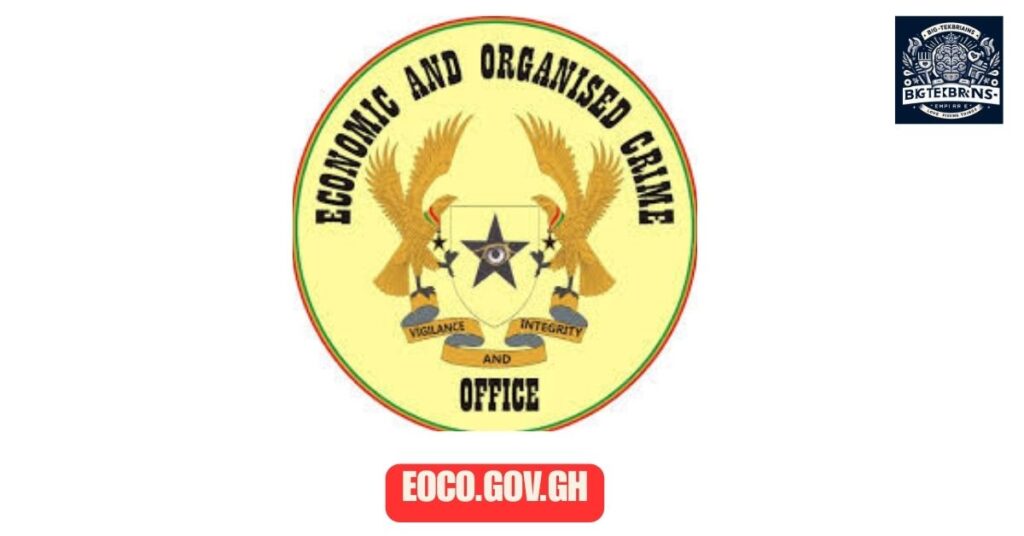Introduction
The Economic and Organized Crime Office (EOCO) in Ghana plays a pivotal role in combating organized and economic crimes. Its operations and authority stem from constitutional provisions, legal enactments, and the oversight of relevant bodies. Below is a detailed exploration of EOCO, covering its historical background, operations, constitutional backing, and more.
Historical Overview
EOCO, formerly known as the Serious Fraud Office (SFO), was established in 1993 under the Serious Fraud Office Act (Act 466). It was restructured and renamed EOCO in 2010 through the enactment of the Economic and Organized Crime Office Act, 2010 (Act 804). The office was created to address the increasing sophistication of financial and organized crimes in Ghana, including money laundering, cybercrime, and corruption.
Evolution:
- 1993: Establishment as the Serious Fraud Office (SFO).
- 2010: Transformation to EOCO under Act 804 to expand its mandate and enhance its operational framework.
- Present: EOCO functions as an autonomous agency with specialized units tackling economic and organized crimes.
Operations
EOCO’s core operations revolve around investigating, preventing, and prosecuting economic and organized crimes. Key areas include:
Investigations:
- EOCO investigates cases of corruption, fraud, tax evasion, money laundering, cybercrime, and other serious offences.
Asset Recovery and Forfeiture:
- Seizes and manages assets acquired through criminal activities.
Prosecution:
- Collaborates with the Attorney General’s Department to prosecute offenders.
Public Education:
- Sensitizes the public about economic and organized crime to foster compliance and awareness.
Constitutional and Legal Backing
EOCO derives its authority from both constitutional and statutory frameworks:
Constitution of Ghana (1992):
- Article 88: Empowers the Attorney General to exercise prosecutorial authority, with EOCO acting under this framework.
Economic and Organized Crime Office Act, 2010 (Act 804):
- Section 2: Specifies EOCO’s mandate to investigate, prevent, and prosecute serious economic and organized crimes.
- Grants EOCO the authority to collaborate with local and international bodies.
Offices and Organizational Structure
EOCO operates with a central office in Accra and regional offices across Ghana.
Head Office (Accra):
- Coordinates national investigations, prosecutions, and policy implementation.
Regional Offices:
- Decentralized units handle localized investigations and operations.
Specialized Units:
- Cybercrime Unit
- Asset Forfeiture Unit
- Intelligence and Surveillance Unit
Leadership and Oversight
Executive Director:
- The head of EOCO is the Executive Director, who oversees all operations and reports to the Minister of Justice and Attorney General.
Leadership Structure:
- Includes Deputy Directors, Heads of Units, and Regional Coordinators.
Overseers:
- EOCO operates under the Ministry of Justice and Attorney General, ensuring compliance with legal and policy frameworks.
Method of Appointments
Appointments to EOCO are guided by Act 804 and other relevant laws:
Executive Director:
- Appointed by the President of Ghana in consultation with the Council of State.
Deputies and Other Key Staff:
- Appointed by the Executive Director, subject to qualifications and operational needs.
How EOCO Functions
EOCO employs a structured approach to achieve its mandate:
Case Referral:
- Cases are referred to EOCO by individuals, entities, or other government agencies.
Investigation:
- EOCO conducts thorough investigations using modern tools and methods.
Collaboration:
- Works with domestic and international bodies like INTERPOL, Financial Intelligence Center (FIC), and the Bank of Ghana.
Reporting:
- Findings are submitted to the Attorney General for prosecutorial action.
Public Outreach:
- Engages communities through education and awareness programs.
References:
- Economic and Organized Crime Office Act, 2010 (Act 804)
- 1992 Constitution of Ghana, Article 88
- Reports and publications from the Economic and Organized Crime Office website: EOCO Official Website.
- Ministry of Justice and Attorney General’s Department publications and legal directives.
- Scholarly articles on Ghana’s anti-corruption framework, e.g., “Strengthening Anti-Corruption Institutions in Ghana” by J.K. Ayee.

